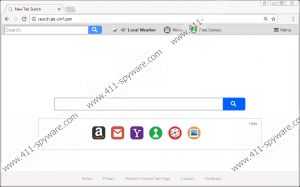Search.pe-cmf.com Removal Guide
Users who are too careless may find their homepages replaced with Search.pe-cmf.com. As our specialists report, the threat might be received by users who download software installers from untrustworthy file-sharing web pages. It is not a malicious application, but it seems it could bring you trouble if it starts displaying unreliable advertisements coming from Search.pe-cmf.com third-party associates. Because of the described behavior, the search engine falls under the classification of browser hijackers. To get to know it better, you should continue reading our report. However, if you want to erase the browser hijacker immediately, we would advise sliding below the text as there you should find our recommended deletion steps. At the end of the page, we have a comments section too, so if you have a question, feel free to leave us a message.
Before we begin explaining how Search.pe-cmf.com might affect your browser, we would like to discuss its distribution. Our specialists say it is most likely that the threat could be distributed with bundled setup files of other doubtful applications, e.g., adware, potentially unwanted programs, and so on. Usually, this kind of software is available on untrustworthy file-sharing web pages, P2P networks, or suspicious pop-up advertisements redirecting to their official web pages. Either way, the browser hijacker’s appearance on your computer signals you might be too careless while downloading and installing software.
Users who obtain installers from suspicious web pages should at least pay attention to the information on the configuration wizard and not hesitate to end the process if something raises a suspicion. For instance, the setup file could inform there will be other unnamed tools installed automatically. Therefore, users who want to maintain the system security should pay close attention to the programs they agree to install, the whole installation process itself, and the websites they use to get the setup files from. For more protection, we always recommend keeping a trustworthy antimalware tool too; it can help both detect and delete potential threats.
If Search.pe-cmf.com manages to get in, it may affect the user’s default browser (e.g., Internet Explorer, Mozilla Firefox, or Google Chrome) by altering its particular files. For example, if its Google Chrome, the threat could go to %LOCALAPPDATA%\Google\Chrome\User Data\Default where it might locate three files called: Preferences, Secure Preferences, and Web Data. Inside of them, there are specific code lines that determine various preferences and other browser’s settings. Since the application’s goal seems to be to replace user’s homepage, it is possible it could locate a line containing the current link to the user’s homepage and change it with Search.pe-cmf.
Then the affected browser should open the search engine every time you launch the browsing application. As annoying as this might be, the main problem is that the browser hijacker could show you advertisements coming from unknown sources. In other words, there is a chance some of them could offer possibly malicious content, redirect you to scam web pages, etc. Naturally, interacting with these ads or content on the web pages they may take you could be dangerous, and if you do not like the idea of putting your system at risk, we advise you to find a safer alternative for Search.pe-cmf.com, e.g., google.com, search.yahoo.com, and so on. To remove the browser hijacker, you can either follow the instructions placed just below this paragraph or do a full system scan with a reliable antimalware tool of your preferences.
Get rid of Search.pe-cmf.com
Internet Explorer
- Press Alt+X.
- Click Internet Options.
- Open the Advanced tab.
- Click Reset and choose Delete personal settings.
- Press Reset again and click Close.
Mozilla Firefox
- Press the Help icon (top-left corner).
- Select Troubleshooting information.
- Click on Refresh Firefox.
- Press Refresh Firefox again.
- Click Finish.
Google Chrome
- Press Alt+F.
- Select Settings.
- Slide down and click on Advanced.
- Scroll down again to select Reset.
- Press the Reset button.
Search.pe-cmf.com Screenshots:


